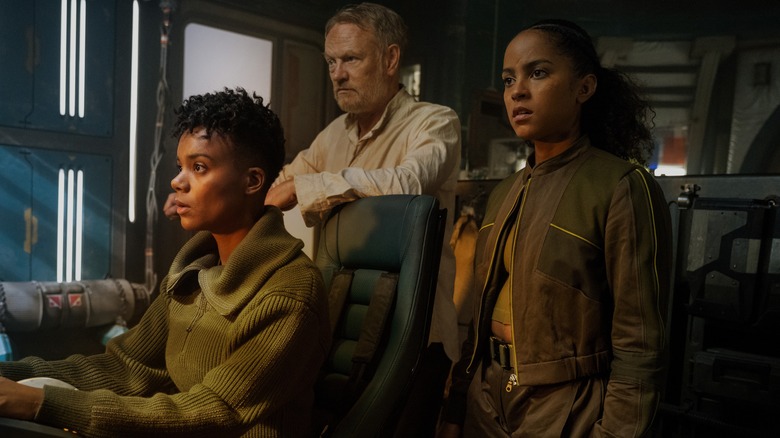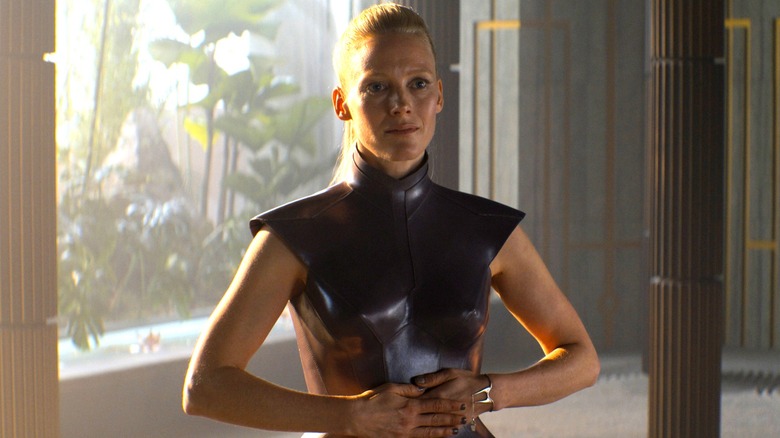Foundation Season 2 Episode 1's Subtle Dig At A.I. Explained
Apple TV+'s "Foundation" is dishing up a complicated smorgasbord of science, mathematics, and geopolitics as it traces the decline, fall, and rebirth of the Galactic Empire far in the future. Hari Seldon (Jared Harris) is the primary mover and shaker of the story, an eminent mathematician who created the field of psychohistory to use complex mathematical calculations to predict humanity's future.
Seldon's algorithmic foreknowledge is stored in a unique device called the Prime Radiant, which functions as the universe's most complicated, data-driven map. When activated, the device reveals millions of calculations, which users can utilize to help see the future. Despite its prophetic aura, the Prime Radiant in the books remains a number map and nothing more. It merely preserves data and helps guide the protagonists. In the show, though, it takes on a mind of its own.
In Season 2, Episode 1, the Radiant dons a humanoid form and confronts a digital copy of Seldon. Remember, his physical body was killed in Season 1 — it's complicated, folks. Details aside, the Radiant challenges its maker to guess who it is. In response, Seldon explains that the Radiant is "an adaptive, predictive, four-dimensional model that takes in new data. It learns, but that's different from having self-awareness or an inherited memory."
In the show, Seldon's remark is fleeting and is quickly lost in the Radiant's reveal that it has achieved its own level of consciousness. However, the remark also has very real-world resonance in 2023. Hari Seldon's distinction between machine learning and artificial sentience is a clever dig at A.I. in an era where the term is soaking up headlines every day.
Asimov, robots, and a century-long struggle with artificial intelligence
We love to joke that tools like ChatGPT toy with sentience and could turn on us in an Asimovian act of disloyalty. But the truth is, as Seldon clarifies, there's a long way between an adaptive algorithm that can "learn" and one that has a mind of its own.
In other sci-fi shows, a dig at A.I. might have less weight or different implications. Star Trek's Data, for instance, is a lovable android that just wants to be human. In Asimov's world, though, artificial intelligence isn't just present. It's a central theme. The author loved to wrestle with the concept of artificial intelligence, and his robot novels are filled with scenarios where humans encounter sentient robots and attempt to contain them within the famous Three Laws of Robotics, which roughly equate to: robots must protect humans first, obey humans second, and protect themselves third, in that order.
However, there is a conspicuous lack of positronic energy in the author's "Foundation" novels, which take place in the same universe roughly 20,000 years in the future. The Apple TV+ series has a little more robotic influence, primarily in the form of Demerzel (Laura Birn), the AI-powered assistant to the trio of cloned emperors guiding the galaxy. In Season 2, Episode 1, we are immediately reminded of Demerzel's synthetic makeup when an assassin chops off half of her head, only for the robot to keep on going without skipping a beat. Demerzel aside, though, there remains a stark absence of robots in "Foundation" — which, at first glance, is odd for an adaptation inspired by the pen of the very man who took that term mainstream in the mid-20th Century.
Why AI (and robotics, in particular) are so limited in Foundation
The absence of robotics and advanced artificial intelligence in "Foundation" isn't accidental — it's quite the opposite. Asimov (who was one of the most prolific authors ever to live) devoted an entire book to reconciling his A.I.-heavy robot novels with his human-only Foundation universe.
"Robots and Empire" breaks down humanity's transition away from robots 15,000 years in the past and establishes a thoroughly critical perspective toward artificial intelligence in the process. The book features a critical breakdown in the Three Laws of Robotics. Various human factions struggle with how to respond, and ultimately the anti-robot group prevails. They go on to settle the Galactic Empire, all without utilizing robots' synthetic muscle and brains to help them.
Hari Seldon's comments about machine learning versus sentient A.I. are a quiet callback to the struggle that kept Asimov feverishly writing dozens of novels for decades throughout the 20th Century. Even in the 21st Century, the battle between the pros and cons of A.I. continue, and in the case of a single line in "Foundation," Season 2, Episode 1, Asimov's commentary on the subject and the modern obsession with its limitless potential have crossed paths. Chances are, this won't be the last time that happens before Apple's show wraps up shop.


